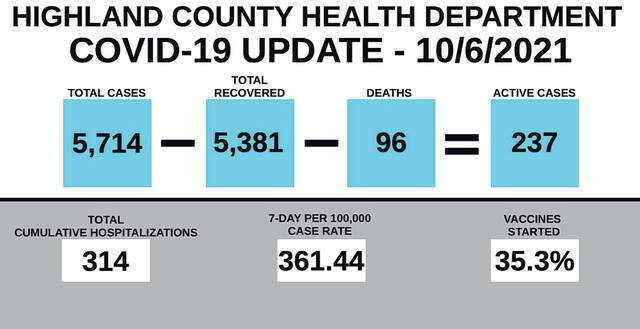
Editor’s note — Highland County Health Commissioner Jared Warner posted an update focusing on COVID-19 on the health department’s Facebook page Wednesday. The slightly edited update appears below:
Cases
Case counts are down sharply from last week. This is welcome news for all health care providers and for our community, as a decline in cases usually leads to a decline in hospitalizations.
Current case counts are 361.44 per 100,000 population on a seven-day average. This means we are seeing about 20 new COVID-19 cases a day.
Hospitalizations were unexpectedly up again early this week at Highland District Hospital. When you are dealing with smaller numbers statistically, you have to be careful in drawing too many conclusions. Hopefully, this is just a brief increase. We are still expecting to see a decline overall based on the dropping case counts we have been seeing. ICU capacity as a region is finally below the 100 percent mark, but some hospitals are still holding more than their normal capacity. I hope to see some large reductions in hospitalizations soon.
Total deaths have jumped to 96 in Highland County, with 15 new deaths reported in the last two weeks. As a reminder, deaths are rarely reported in real-time. We often see multiple deaths hit our system at the same time, even if they happened at different times. This can make our death counts an unreliable way for us to determine how things look in our community currently. Of all our indicators, deaths lag the farthest behind.
We have also started to see a slowdown in our rate of case decline, which could indicate that the bottom of our Delta curve is in sight. In other words, things are still falling, but not as fast as they were last week. With Delta being more transmissible and having higher viral loads than the previous strains of Covid, we may not drop to the same low levels that we saw in June and July.
Merck announces antiviral
specific to COVID-19
The drug manufacturer Merck has announced that it will be submitting research data to the FDA on a new antiviral medication, molnupiravir, designed specifically to treat COVID-19. Initial results have been very promising, with this medication cutting the risk of hospitalization or death in half. Fingers crossed that the review goes well and that we will have this available soon.
This kind of treatment will be especially important in communities like ours with very low vaccination rates. Initial supplies (assuming FDA approval) of this medication are likely to be very limited, but over time tools like this one can change the game entirely.
Next FDA discussions
The FDA’s scientific advisory committee will be reviewing several things in October. This review is an important step in the larger process of FDA/CDC approval for emergency use or full approval of a medication or vaccine.
Oct. 15: Moderna Booster Discussion
Oct. 16: J&J Booster
Oct. 16: Mixing and Matching of Vaccines
Oct. 26: 5- to 11-year-old Vaccination Group
Right now, Moderna and the J&J vaccine are not approved for boosters. Moderna is approved for third doses for specific people with immune system concerns. The health department can’t tell you if you are eligible for a third dose, so talk to your doctor to see if you qualify.
Why bother with vaccination?
I have heard this question a few times recently from people that I have talked to. It usually goes, “If I can get Covid and pass Covid on even while vaccinated, why bother with the vaccine? What is the point?” This is a fair question and one that I think our federal government has done a pretty terrible job of communicating.
Here is why it is a good idea to get vaccinated even though it doesn’t prevent all infection or prevent vaccinated sick people from passing it on to others.
Vaccinated people are:
1. Vaccinated people are less likely to get sick. We have multiple studies now that demonstrate that vaccinated people are less likely to get sick in the first place.
2. Infectious for a shorter time frame — Vaccinated people may have a shorter infectious period than unvaccinated people. This means that the time in which a breakthrough case person can spread COVID-19 to others is shorter, and therefore fewer other people will tend to get infected. More research is needed here, but this is promising.
3. Less severe illness — Breakthrough cases tend to be less severe in symptoms when people are vaccinated. As would be expected, breakthrough cases are much more likely to happen in areas with high disease rates.
4. Less likely to need hospitalization — Vaccinated people are less likely to require hospitalization if they catch Covid because they are at less risk for severe disease.
5. Less likely to die —Vaccinated people are less likely to die if they catch Covid.
There are still plenty of things that we don’t know and are still learning, but these five things seem to be well supported with currently available information. Vaccination remains the most effective way to control COVID-19 in our community, and the best way for individuals to protect themselves and their families from illness.


